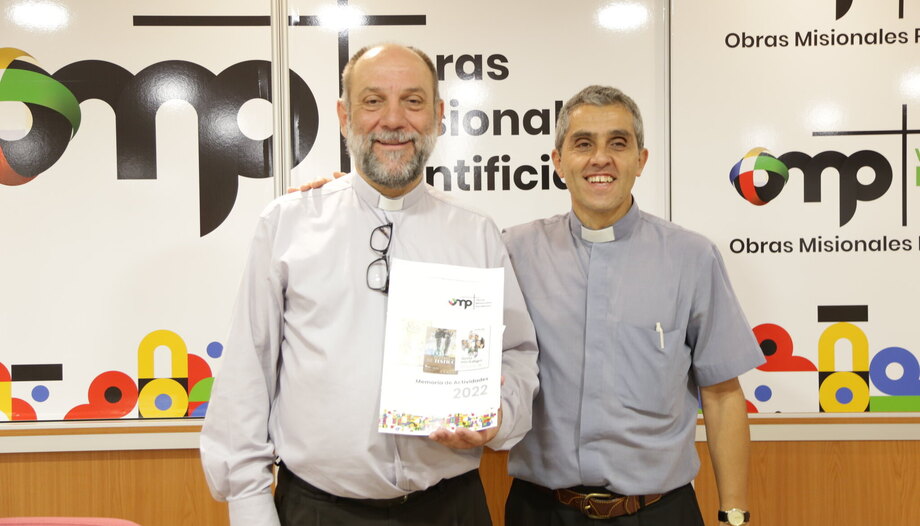The Pontifical Mission Societies (OMP) are composed of four fundamental works: the Domund, aimed at spreading the faith and helping all mission territories, founded by Blessed Pauline Jaricot; Missionary Childhood, to foster missionary awareness in children throughout the world; Native Vocations, aimed at helping seminaries and religious in mission territories; and the Pontifical Missionary Union, dedicated to the formation of missionaries.
This morning, OMP Spain presented its report of activities for the year 2022. The event was attended by José María Calderón, director of OMP Spain, and the priest from Burgos, Alfonso Tapia, missionary in Peru.
New structure
The report of activities for the year 2022 defines the Pontifical Mission Societies as "a worldwide network at the service of the Pope to support the universal mission of the Church and the young Churches with prayer and missionary charity". They have been present in Spain since 1839.
Its objectives are "to support the mission territories" (currently 1118) and "to promote the missionary spirit".
During the year 2022 Pope Francis created the Dicastery for Evangelization, on which the Pontifical Mission Societies now depend. Therefore, they have come under the direct jurisdiction of the Pope.
On December 3, 2022, a new president general of PMO, Monsignor Emilio Nappa, was also appointed to replace Monsignor Giovanni Pietro Dal Toso.
Logo
In addition, in October OMP debuted a new image with a new logo. "It includes, as requested by Rome after the celebration of the Extraordinary Missionary Month 2019, the symbol used for this occasion. It is a cross with the colors of the missionary rosary, forming a circle embracing the first letter of OMPas if it were the world. All the PMO's around the world now include the same symbol," the memo states. In addition, the new logo reflects the four works through different colors: red for the World Mission Sunday Campaign, blue for Missionary Childhood, green for Native Vocations and yellow for the Pontifical Missionary Union.
A year of awards and commemorations
The year 2022 also featured numerous commemorations: the 400th anniversary of the founding of Propaganda Fide; the 200th anniversary of the founding of the Work for the Propagation of the Faith; the 100th anniversary of the Pope's conversion of the three existing missionary works into pontifical works; and the 400th anniversary of the canonization of St. Francis Xavier, patron saint of the missions.
In addition, awards were established for Blessed Pauline Jaricot, foundress of Domund and blessed since May 2022, and Blessed Paolo Manna, missionary in Burma and founder of the Pontifical Missionary Union. The first is dedicated to missionaries, and last year was awarded to Sister Gloria Cecilia Narvaez and missionary Pierluigi Maccalli, who were kidnapped for 6 and 3 years respectively by jihadist groups. For its part, the Paolo Manna Award is dedicated to a person or institution that helps to make the work of missionaries better known in Spain. In 2022, this award was given to Ana Álvarez de Lara, former president of Manos Unidas and Misión América.
In 2022, the Missionary Childhood Camps were also held for the first time at the Castle of Javier, and the second edition is expected to take place this year.
Increase in revenues
Another relevant fact is that in the year 2022, OMP increased its collection by about 400,000 euros and Spain, with about 7000 missionaries, is presented as the country that contributes the most missionaries in the world. "Spain is a very generous country," said José María Calderón.
Specifically, during 2022 Missionary Childhood collected 2,917,803.04 euros, Native Vocations 2,362,061.64 euros and Domund 13,076,309.65 euros. As the report points out, "the total economic cooperation of Spain to the mission in 2022 was 18,356,174.33 euros".
Missionary in Peru
Then, the missionary Alfonso Tapia, who, despite being from Burgos, was ordained in Peru in 2001, spoke. He is a missionary in the Vicariate of San Ramon, and explained that an apostolic vicariate is a young diocese that "lacks everything" and depends directly on the Pope. They are very extensive territories, with very complex communications, few faithful and very poor. He also pointed out that they are insolvent and cannot get by without outside help.
"In Peru distances are not measured in kilometers, they are measured in hours," he said, due to the state of the roads or the lack of them, since there are areas of jungle or rivers that make transportation very difficult. He explained that from the seat of the vicariate to his parish there are 277 km, but it takes him four hours for the first two hundred and three and a half hours for the rest.
Increase of lay missionaries
Finally, José María Calderón and Alfonso Tapia commented that, although it is true that the number of missionaries is decreasing every year and they have a very high average age (around 75), in general there is an increase of young lay missionaries and missionary families.
Alfonso Tapia pointed out several first-hand examples of lay people who decide to stay in Peru to help in the mission, or even the case of a Polish missionary who married a Peruvian missionary and have settled in the area as a missionary family.







